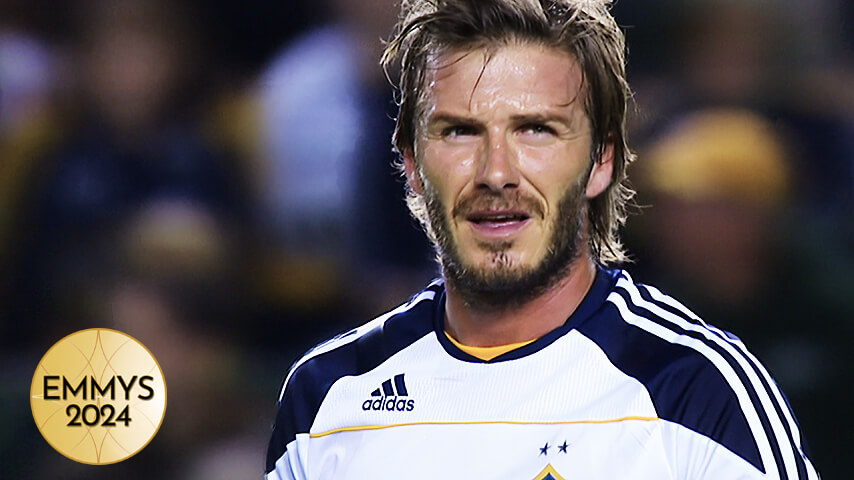Against All Odds, Beckham Deserves The Docuseries Emmy

Over the last week, The A.V. Club has been making the case for some of the shows and performers who we think deserve an Emmy this year. And now that the August 26 deadline for Television Academy members to cast their votes is fast approaching, we finally turn our attention to that most hotly debated of categories: Outstanding Documentary Or Nonfiction Series.
We keed, we keed, to misquote Triumph. But considering that docuseries have increasingly become part of our steady TV diet, not to mention some of our favorite shows each year, let’s dig into the 2024 Emmy contenders. There’s Telemarketers, a nearly-two-decades-in-the-making exposé with the cigarette stench and outsider comedic beats of American Movie; ID’s conversation-starting sexual-abuse bombshell Quiet On Set: The Dark Side Of Kids TV; the heartening record-label saga Stax: Soulsville U.S.A.; the much-anticipated (and weirdly backloaded) followup to a true-crime phenom, The Jinx – Part Two; and then…Beckham.
So how did we get here? How does a project about a very handsome, very rich, and very famous guy—that is, soccer superstar David Beckham, whose life on and off the pitch has been picked apart ad nauseam in the tabloids—stand out in such a strong, diverse category? It’s certainly not as vital and industry-changing as Quiet On Set, or as refreshing as Telemarketers, which, among these nominees, has the sort of shaggy-haired, personal spirit we'd like to see more of in episodic TV docs. But Beckham, sharply directed by Wes Anderson repertory player Fisher Stevens, is fascinating, carefully crafted, entertaining, and certainly the most stylish of the bunch.
What could have in lesser hands been mere hagiography feels bigger here. Beckham isn’t a document just of this dude, or of this sport, or even of Manchester, really, but rather a culture and a time—not unlike Jason Hehir’s The Last Dance, which masterfully wrapped you up in the on-and-off-the-court drama of the Chicago Bulls’ late-’90s run and also drove home how insanely ubiquitous that team was. Like Jordan & Co. getting mobbed in Paris, Becks, during his Real Madrid days, attracted more than 45,000 fans in Tokyo to a practice. Wherever he went, he'd get swarmed by paps, with folks banging their palms on his car windows as if he was Bob Dylan in Dont Look Back.
“When Becks’ star rose, it turned around completely,” explains New Order and Joy Division’s Peter Hook. “And we watched the footballers become the rock stars.” Underline that sentiment with a burst of Oasis’ ”Supersonic,” photos of the scene at Manchester's legendary nightclub The Haçienda, and clips of Becks doing his thing for Man United, the team he’d dreamed of playing for since he was a kid, and it’s hard not get a heady dose of the feels or the sense that whatever excitement was happening reached far beyond the gates of Old Trafford.
And then, of course, there is the unavoidable Posh Spice of it all, with the two becoming the sort of celebrity power couple that’s honestly hard to think of a modern equivalent of, drawing, depending on the week, the love and nonstop chatter and ire of seemingly an entire country. On the fun side of that teasing, Stevens' docuseries drops in a bit from Ali G’s interview with the Beckhams for Comic Relief. “So tell me, is your little boy starting to put whole sentences together?” the main man asks Victoria after she was talking about her newborn son, Brooklyn. “He’s saying it in little bits and pieces, yeah,” she replies. “And what about Brooklyn?” On the not-so-fun side, Victoria recounts "75,000 people" singing ”Posh Spice takes it up the ass” in unison at a match.
But as much as this couple is in the spotlight here, the narrative thrust of Beckham stays pretty squarely on the athlete’s play—both the highs, like when he, at 21, kicked the “Goal of the Century” for Man United, per one newspaper headline, to the lows of getting a red card for England at the World Cup, becoming public enemy No.1, complete with being mailed bullets and hung in effigy outside a London pub. The latter essentially breaks him, with Becks’ teammate saying it was all laid on his shoulders before mental health was openly discussed, a struggle Beckham wrote about this week in The Hollywood Reporter.
Keeping the ups and downs in mind, like any good sports story, Beckham’s main achievement is delivering on those Friday Night Lights-esque sports-movie beats, the kind where the down-on-his luck hero delivers against all odds one last time. To build these moments, Stevens cuts between the action on the pitch then and the athletes reflecting now, shooting each à la Errol Morris, with them looking directly into the camera as they watch the plays. (Speaking of Stevens, the score during these buildups is often reminiscent of Succession’s.) It all comes together to paint a fuller portrait of the man many of us thought we knew and, like The Last Dance and the best of this genre, act as a reminder that it’s always more than just a game.


